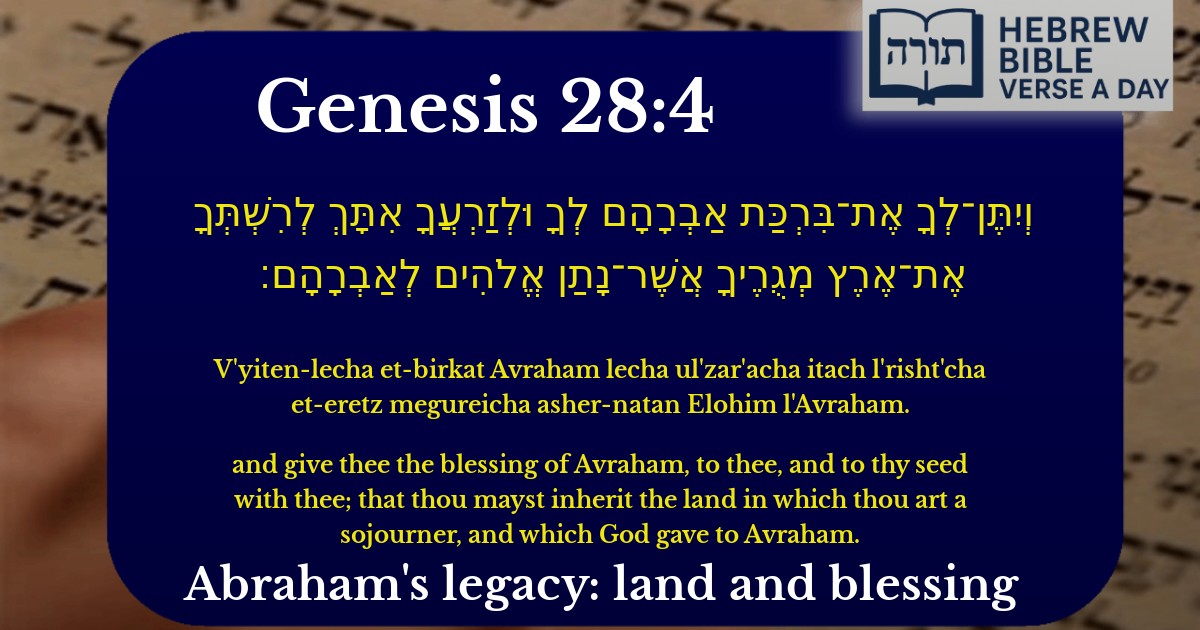Join Our Newsletter To Be Informed When New Videos Are Posted
Join the thousands of fellow Studends who rely on our videos to learn how to read the bible in Hebrew for free!
Hebrew Text
וְיִתֶּן־לְךָ אֶת־בִּרְכַּת אַבְרָהָם לְךָ וּלְזַרְעֲךָ אִתָּךְ לְרִשְׁתְּךָ אֶת־אֶרֶץ מְגֻרֶיךָ אֲשֶׁר־נָתַן אֱלֹהִים לְאַבְרָהָם׃
English Translation
and give thee the blessing of Avraham, to thee, and to thy seed with thee; that thou mayst inherit the land in which thou art a sojourner, and which God gave to Avraham.
Transliteration
V'yiten-lecha et-birkat Avraham lecha ul'zar'acha itach l'risht'cha et-eretz megureicha asher-natan Elohim l'Avraham.
Hebrew Leining Text
וְיִֽתֶּן־לְךָ֙ אֶת־בִּרְכַּ֣ת אַבְרָהָ֔ם לְךָ֖ וּלְזַרְעֲךָ֣ אִתָּ֑ךְ לְרִשְׁתְּךָ֙ אֶת־אֶ֣רֶץ מְגֻרֶ֔יךָ אֲשֶׁר־נָתַ֥ן אֱלֹהִ֖ים לְאַבְרָהָֽם׃
וְיִֽתֶּן־לְךָ֙ אֶת־בִּרְכַּ֣ת אַבְרָהָ֔ם לְךָ֖ וּלְזַרְעֲךָ֣ אִתָּ֑ךְ לְרִשְׁתְּךָ֙ אֶת־אֶ֣רֶץ מְגֻרֶ֔יךָ אֲשֶׁר־נָתַ֥ן אֱלֹהִ֖ים לְאַבְרָהָֽם׃
🎵 Listen to leining
Parasha Commentary
📚 Talmud Citations
This verse is quoted in the Talmud.
📖 Berakhot 16b
The verse is referenced in the context of discussing the blessings given to Abraham and his descendants, particularly in relation to the inheritance of the land.
📖 Megillah 17a
The verse is cited in a discussion about the order of blessings in the Amidah prayer, emphasizing the continuity of Abraham's blessings to his descendants.


Context of the Verse
This verse (Bereshit 28:4) is part of Yitzchak's blessing to Yaakov before he departs for Charan. Yitzchak reiterates the divine promise originally given to Avraham, emphasizing the continuity of the covenant through Yaakov and his descendants.
The Blessing of Avraham
Rashi explains that "the blessing of Avraham" refers specifically to the promise of the Land of Israel and abundant progeny (Bereshit 12:2-3). The Ramban adds that this includes both material prosperity and spiritual greatness, as Avraham's blessing encompassed both physical and metaphysical dimensions.
Inheritance of the Land
The phrase "to inherit the land of your sojournings" carries deep significance:
The Dual Nature of the Promise
The verse contains two key elements of the covenant:
Midrashic Insights
The Midrash (Bereshit Rabbah 68:9) connects this blessing to the future Temple service, suggesting that inheriting the land is ultimately about creating a dwelling place for the Divine presence. The Kli Yakar emphasizes that the blessing is given "with you" (איתך) to show that Yaakov's personal merit would protect his descendants throughout their future exiles.